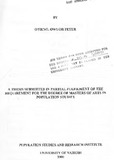| dc.description.abstract | The Family Planning Programme in Kenya has always approached the issue of fertility regulation with females as the target group, while ignoring men who are equally involved in the process of reproduction/procreation, and who in many communities are the main decision-makers. In the same tradition, most studies that have been conducted on the level of awareness and practice of family planning have focused on women, rather than on both gender. As a result men's knowledge and attitude of family planning is often misunderstood and shrouded in uncertainty (where people act on rumours and wrong perceptions of methods).
This study set out to investigate men's knowledge, attitude and practice of family planning in Kenya, and how they are influenced by various demographic, socio-economic and socio- cultural factors namely age, marital status, current family size, education, preferred family size, exposure to mass media place of residence, religion and type of marital union. The ultimateaim is to generate information that can form the basis of programmes to improve men'sawareness, approval and acceptance, and consistent use of family planning methods.
Data for the study was drawn from the 1993 Kenya Demographic and Health Survey (the malequestionnaire component), which covered 2336 men, aged 20-54 years. The sample was national in' scope, based on the national master plan maintained by the Central Bureau of Statistics (CBS). Analysis was undertaken using three statistical methods namely frequency distribution and percentages, cross-tabulation and the chi square, and finally logisticregression analysis, all performed with the help of a computer package-SPSSIPC+.
Major findings of the study indicate that there is high level of knowledge (awareness) of family planning methods and source and favourable attitude among men in Kenya, but limitedreadiness to use both as clients and supportive partners. The most widely known methods were the condom (94.5%), the pill (92.9%), female sterilization (86.3%), and
periodic abstinence (84.2%). There was an almost universal approval as 90.8% of the men interviewed approved of family planning.
However, this reported high knowledge and considerably favourable attitude has not been translated into practice. While about 50 percent of the respondents reported current use of "any" method, further analysis of practice of specific modem methods revealed that, a part from the condom (12.4%), less than lO percent of men were actually practising any specific
method.
Based on the findings, a number of relevant recommendations for policy and areas of further research are suggested. There should be increased use of radio and newspapers as a channel for disseminating family planning information; family planning education should be introduced in primary school education curriculum, possibly in Home science lessons: there should also be deliberate programs to change men's preferred family sizes. which is still high (over four children). Further research should address the gap between high knowledge, positive attitude on one hand. and very low use on the other hand, and between ever-use and current use of specific methods | en |

